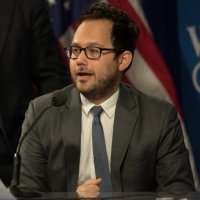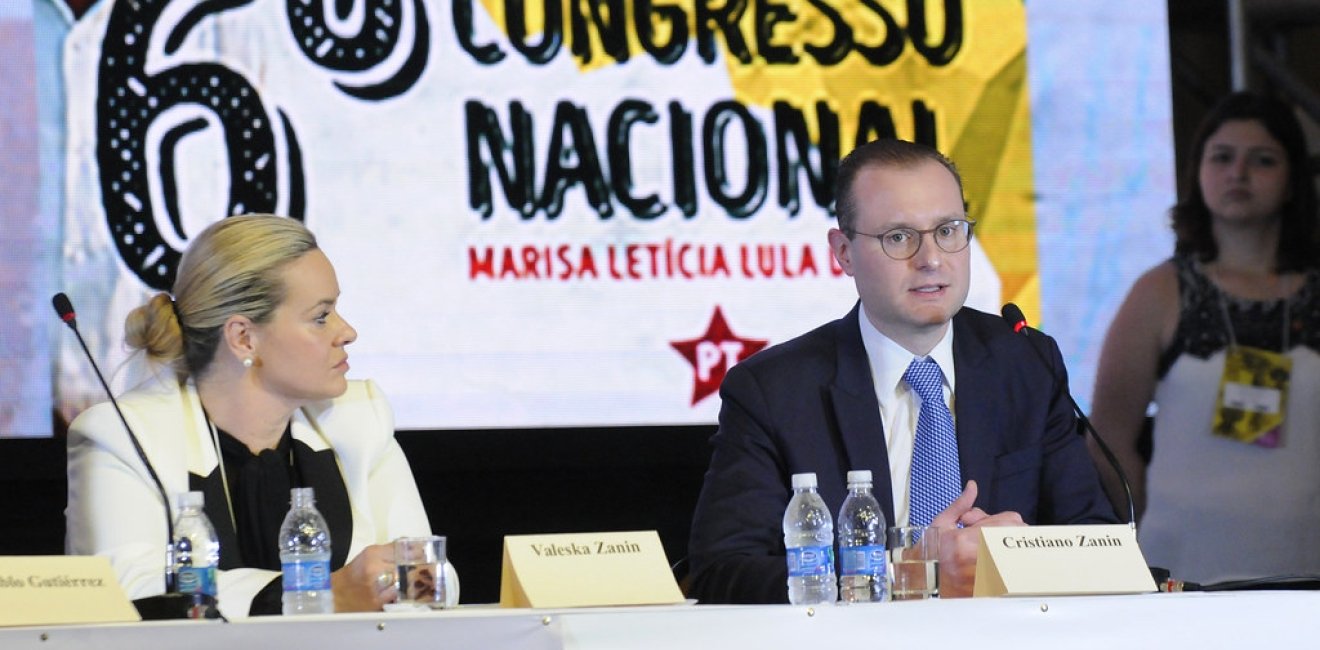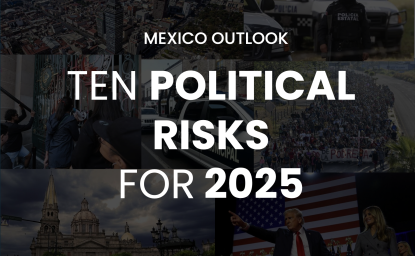Cristiano Zanin and Valeska Martins are both graduates of the Pontifical Catholic University of São Paulo and partners at the Teixeira Zanin Martins Advogados law firm with offices in São Paulo and Brasilia. Together, they represent former Brazilian President Luiz Inácio Lula da Silva, including in his defense against accusations that he was involved in the Lava Jato (Car Wash) political corruption scheme. The following interview was conducted on March 23rd by Nick Zimmerman, Senior Advisor to the Brazil Institute and former White House National Security Council Director for Brazil and Southern Cone Affairs.
*The conversation has been condensed and edited for clarity. The views and opinions expressed below are the interviewee's own, and do not necessarily reflect the views of the Brazil Institute or the Wilson Center
Nick Zimmerman: Let’s start with a bit of background on both of you. I’m curious about what drew you both to the law initially and how you came to eventually represent former President Luiz Inácio Lula da Silva?
Valeska Martins: Well, I actually can remember myself wanting to be a lawyer since I was ten. I come from a family of lawyers and so does Cristiano. I don’t know if that took a toll on our decisions, but we love practicing law. It’s our life. It’s what makes us alive, actually. And Lula has been a client of ours for quite some time, for many years now. This case came into the firm, a very challenging case, and we decided to take that challenge.
Cristiano Zanin: Yes, like Valeska, I’m also a private lawyer. I have been practicing law for over 20 years. We studied at the same university in São Paulo, and we formed a team.
Valeska Zanin: Literally, because not only do we work together professionally, but we are also married and have kids. So, it’s a 24 hour a day partnership.
Nick Zimmerman: A multi-faceted partnership indeed. Let’s now shift topics and talk about what Lula’s legal situation has been over the past several years. It would be most useful to hear your perspective on how this all really got started. Perhaps with an overview of the charges that were filed against Lula and that eventually led to his imprisonment in 2018? And finally, perhaps you can also explain what his current legal situation is. Is there any chance that his political rights could be stripped away again ahead of this year’s election?
Cristiano Zanin: Sure, Lula was unfairly accused of being involved in a corruption scheme, but all the criminal cases have been closed. In our view, there is no risk of Lula losing his political rights again.
Valeska Martins: It’s important for people to understand that all of the charges, and they vary, have been frivolous with no evidence whatsoever of guilt, which is what you have to prove as a prosecutor. You have to bring evidence of guilt and no evidence of guilt has come forward. During the discovery phase, we found overwhelming evidence of innocence and we then filed all of that evidence. We hired experts to follow the money and make sure that there was no doubt that Lula had never received any improper value coming from any public company or from any construction company.
No quid pro quo was ever found in any of the evidence in any of the files. So, the cases have all been closed and Lula now stands as an innocent man to run his election campaign. We don’t believe, as Cristiano said, that anymore frivolous charges might be brought against him at this point. If they are brought, we will definitely defend against them because we believe in what he did and how he acted.
No quid pro quo was ever found in any of the evidence in any of the files. So, the cases have all been closed and Lula now stands as an innocent man to run his election campaign."
Nick Zimmerman: You’ve answered this question partially already, but I think it’s important to dig in further. There is a perception in some legal circles, both in Brazil and in the international community, that Lula was released from prison and his political rights were restored primarily because of judicial overreach and bias. We recently saw the news actually that the lead prosecutor in the Lava Jato (Car Wash) corruption investigation, Delton Dallagnol, is actually going to be fined for improper conduct. But there is a lingering doubt about whether or not the release of Lula is actually because of direct evidence of his innocence or whether it really has more to do with the fact that the Brazilian judiciary and the prosecutors involved in the case overreached and demonstrated political bias against him. How would you respond to such arguments and concerns?
Valeska Martins: Normally, if the prosecutors and judges followed the rule of law, there should have never been any procedures [against Lula]. They were frivolous. They should have never been brought against him in the first place. With procedures that lack evidence and lack legal logic, you have to basically invert the burden of proof, which is what happened in these procedures to prove Lula’s innocence. And by all means, this is what we did technically. I think it’s pretty much certain that whoever says that there is evidence, had more than enough time to sort through with seizures, with telephone tapping and interceptions, with all kinds of prosecutorial power in the investigation, to come up with and present any kind of evidence against Lula. And this was not the case.
If the prosecutors and judges followed the rule of law, there should have never been any procedures [against Lula]. They were frivolous. They should have never been brought against him in the first place."
Cristiano Zanin: Yes, I would like to add that Lula was accused of having set up a criminal organization. Other lawsuits were canceled, not because there were minute errors, but because the judge was biased and using the laws to persecute Lula in a practice that we call lawfare. In lawfare, the law is used strategically to achieve illegitimate ends.
Valeska Martins: I think it is important to remind our listeners that we have been with him since charges were first brought against him and we have reviewed all of the documents. We talked to witnesses, and we were certain that the charges were frivolous. We took this case in 2016 before the UN Human Rights Committee because we were certain, our technical-legal opinion was certain, that Lula was going to be convicted because it was never about any evidence. It was about a group of participants and a group of judges just using the prosecutorial system for personal and political gain. That is how certain we were of how the accusations were frivolous.
Nick Zimmerman: Let me push back in the spirit of debate and ask one follow-up question. The broader corruption scheme of Lava Jato, broadly speaking, has been proven. In fact, billions of dollars have been returned to Brazilian government coffers. Petrobras itself, it’s a fact, has recognized that this corruption scheme from the company did occur. So, for me to understand and for our audience to better understand: Your argument is not that corruption did not occur during the Lula government more broadly, but that there is no proof linking the former president to said corruption scheme. Is that correct?
Valeska Martins: I can confirm that corruption, of course, in every single country should be dealt with properly within the law. Fighting corruption is absolutely essential to democratic government. It is a pillar for all states. However, the PowerPoint presentation from Dallagnol [that led to his fine], for instance, the fact that he [the prosecutor] said that Lula was the commander of this big corruption scheme, that was never the case. There was never any link, direct or indirect, that would ever allow the prosecutors to say that Lula was the commander, or to affirm that Lula was involved in certain other schemes, like the Odebrecht trials. We actually were the only ones who analyzed those files forensically with experts, and Lula was never mentioned. There is no link directly or indirectly of any quid pro quo, any wrongdoing. This is what we, as democratic citizens, have to understand. Our technical-legal work has been based on proving his innocence, even though it’s an inversion of burden of proof, which we achieved. This is why we are so certain and we are here at this point saying there is no evidence of any guilt.
We took this case in 2016 before the UN Human Rights Committee because we were certain … that Lula was going to be convicted because it was never about any evidence. It was about a group … just using the prosecutorial system for personal and political gain.”
Nick Zimmerman: Let’s move on. You began to touch on this in the latter part of your answer just now. But I think we would be very curious to hear from you on this: now that Lula’s status has been resolved and the cases have all been closed, how do you see the legacy of Lula’s case and what impact do you think it will have on the future of the Brazilian judiciary system? What is its legacy more broadly for the strength of Brazil’s democratic institutions moving forward?
Cristiano Zanin: It’s important to say that this great injustice did not affect only Lula, but all the Brazilian citizens who wanted to vote for Lula in 2018 and could not. In other words, we have to reflect a lot on what this has meant for our democracy.
Valeska Martins: I believe the Car Wash Operation and how it unfolded is one of the biggest attacks on our democracy and our institutions. It only goes to show that once again, I repeat this because it matters: fighting corruption is essential, but it can only be done within the rule of law. If not, the law can become violence. Violence when it is misused because it can erode a democratic state and that is one of our main concerns. It can happen to anyone in Brazil, not only one person, or to anyone anywhere in the world.
Fighting corruption is essential, but it can only be done within the rule of law."
Nick Zimmerman: And do you think the outcome in the case of Lula, will help diminish this risk, this concern that you have and have expressed moving forward in Brazil specifically? Or do you think it remains an ongoing threat moving forward, whether in this election or future elections?
Valeska Martins: I think we have to learn from this experience. It was a serious precedent, a dangerous precedent. We had a situation here of challenging elected officials all the time, challenging elected presidents. So, I think we have to, at this point, understand what really happened and move on so that our neither our country nor our democracy continue to suffer.
We are entering a year of elections and we just hope that the lessons from Lula’s case will be upheld, that institutions will be respected, that members of such institutions have to abide by the rule of law, and just hope for the best in the future. Not only for Brazil, but for all citizens around the world.
Nick Zimmerman: Speaking of the world, and international dynamics and relations, both Brazilian and U.S. elected officials have questioned how bilateral judicial cooperation was managed with respect to the Car Wash corruption investigation. More specifically, there have been concerns that procedures outlined in a bilateral treaty between the two countries that governs legal cooperation were not properly followed. Some have insinuated that these irregularities rendered the United States partially responsible for Lula’s imprisonment and even the impeachment of his successor, President Dilma Rousseff. How do you see these issues?
Cristiano Zanin: We were able to prove in the Supreme Court of Brazil that there was international cooperation outside of official channels between Brazilian and foreign authorities, including some U.S. authorities. This type of situation disrespects the bilateral agreement signed between Brazil and the United States, which provides for specific procedures for international cooperation, and those procedures weren’t followed.
Valeska Martins: We are talking about the informal exchange of evidence. I think we have to learn from these procedures and improve because international cooperation on criminal matters is essential for Brazil, as it is essential for the United States and other countries. We just need more transparency moving forward.
Nick Zimmerman: Valeska, for those in our audience who are less familiar with the bilateral treaty and for those of us who are not in the legal profession, could you be a little more bit specific? It sounds to me that in particular, one of the concerns, is that the chain of communication became a little too familiar, that it was occurring over text messages, cell phone communications, and was not proceeding through official channels. That of course does sound disturbing but it doesn’t, in and of itself, show that in terms of content that there was, for lack of a better expression, some conspiracy intent from Department of Justice officials. So, I’d like to hear more about what caught your attention as you were investigating and defending the former President.
Valeska Martins: As a principle of law, the informality of exchange of any information made our defense harder, and that’s when our attention was caught, with this informal exchange of information. In Brazil, all information is supposed to be disclosed equally to both sides. I believe that is the case in the United States as well, but I’m not an American lawyer. We thought it was important to review the way they informally exchanged all types of information, including classified information between the Brazilian and Swiss governments using Telegram and other non-official channels. It’s important to make sure that this doesn’t happen again because it might be taken advantage of by a certain group, by agents in Brazil or the United States, for their own personal gain. I don’t think that is abiding by the rule of law.
Nick Zimmerman: Thank you, Valeska. Let’s look to the future then. Moving forward, how do you think that Brazil and the United States can work together better to protect the rule of law, not only in the two countries, but around the world and in so doing, also help strengthen democracy itself? Where would you start?
Cristiano Zanin: I think that international cooperation between Brazil and the United States is very important, including the fight against crime and corruption. It’s also important to protect democracy in all places. What needs to happen is an improvement so that all official channels are used and are transparent.
Valeska Martins: As I said, international cooperation is essential to fighting crime. We have to learn from the past and move on. It’s not one government against the other. It’s a group of people here and there. We have to learn from the past and improve the system. That’s the idea, basically start the discussion, and move forward.
I think that international cooperation between Brazil and the United States is very important, including the fight against crime and corruption. It’s also important to protect democracy in all places. What needs to happen is an improvement so that all official channels are used and are transparent."
Cristiano Zanin: It’s important to enhance the arrangement between Brazil and the United States.
Nick Zimmerman: Both, thank you very much for your time today especially given how busy you both are. Thank you.
Valeska Martins: Thank you!
Cristiano Zanin: Thank you! It’s a pleasure for us.
Author


Brazil Institute
The Brazil Institute—the only country-specific policy institution focused on Brazil in Washington—aims to deepen understanding of Brazil’s complex landscape and strengthen relations between Brazilian and US institutions across all sectors. Read more

Explore More
Browse Insights & Analysis
Imamoglu’s Arrest Sparks Nationwide Unrest and Raises Fears for Turkish Democracy



